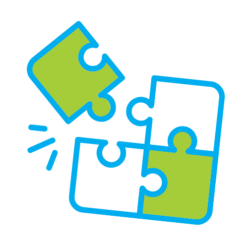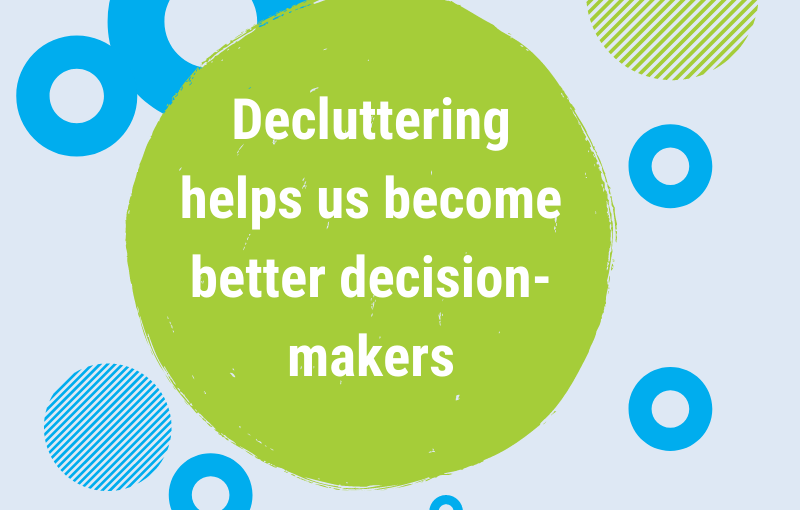THE CLUTTER SERIES
The ‘Clutter Series’ discusses important aspects of the clutter in our homes and minds, including the close relationship between clutter and our general wellbeing.
Click here to read a summary of the main insights of this series.
How decluttering helps us become better decision-makers
Decluttering consists of two main activities: (Click to read: What is decluttering)
-
- The practical/physical activity of removing/getting out the things we decided to get rid of,
- and the mental/emotional activity of making decisions about what belongs to the category of things we no longer need/want to have with us.
The first activity – the physical work – has to be done properly, of course, if we wish to make our decluttering project a success.
However, it’s the second activity – making decisions – that holds the potential of far-reaching life changes.
Immobilisation and stagnation are caused by a lack of decision making.
That’s how the clutter comes into our home:
We, for example, make spontaneous shopping decisions without considering how useful the new possessions actually are to us. And we avoid to make let-go decisions about those of our possession that we no longer use, need, love.
So things that don’t serve us are allowed to come in and then to stay where they are – they don’t get used, they don’t move, they become clutter.
When we make decisions, we create momentum and action.
As soon as we decide to declutter our home, we have done the first and probably most important decision of the decluttering process:
We made the decision to no longer tolerate the current reality, to change it actively, and to move on to a better – or at least different – future.
Decluttering improves our decision-making skills and confidence.
While we are sorting and clearing up our stuff we need to make decisions about whether to keep or discard items, and where to put them. This is not easy, at least not in the beginning.
However, while looking at hundreds of items and asking ourselves if they serve us, we get fitter and faster in making decisions.
We begin to feel more confident about our decision-making skills, and we are more willing to use these skills – not only to solve clutter problems but also to make changes in other areas of our life.
Decision-making increases our self-awareness.
Many of our belongings are closely connected to certain expectations or emotions which we are often not consciously aware of.
We buy something because we believe: If I own this thing, I will be, look or feel a certain way.
For example:
-
- If I buy this nice dining table, I will become a great entertainer.
- If I get new running shoes, I’ll get properly prepared for the marathon.
- If I use this cream, my skin will look fresh and young.
As soon as we realise and accept the fact that we often buy things because of the person we want to be or the lifestyle we want to have, we can dig a bit deeper to find the emotions, needs and desires behind our shopping behaviour.
The analysis of our deeper motivations doesn’t feel comfortable all the time, we might experience feelings of guilt or shame.
But the self-discovery process helps us let go of our emotional attachment to certain things.
We gain clarity and it becomes easier to decide what needs to go because it has nothing to do with our true self.
If we decide to let go of false aspirations and hopes we also get rid of stress and negative emotions.
Decision-making requires us to uncover and realise our values and our vision in life.
Before we can start to make decision about our belongings, we have to become well aware of where we are, how we got there, why you want to change our home/life, and where we want to go.
Having a deep understanding of our current situation, our values and our vision for the future enables us to make the right decisions during the decluttering process and to get and stay focused and motivated.
Making decisions and getting active result in feeling more powerful and in control.
In most paralysing life-change situations just getting active, doing something, can immediately make us feel stronger and more in control.
Decluttering a room in our home, for example, or clearing up a kitchen drawer, re-organising the paperwork – these are all examples of hands-on activities that directly deliver visible results, an experience of personal power, and a proof of our ability to initiate positive change.
“A messy closet or an overflowing in-basket is a trivial inconvenience, yet getting control of our stuff makes us feel more in control of our lives.” (Gretchen Rubin)
Decluttering helps us to learn from past decisions.
One of the reasons why decluttering can be quite painful is because it confronts us with the effects of our past decisions.
We, for example, realise how much money we spent on items that have become clutter. This can cause feelings of shame and regret.
The upside of facing our past mistakes is that we can learn from them.
Becoming more aware of what went wrong can help us make better decisions in the future. We might also become more intentional in our shopping habits.
Decluttering decisions make it easier to accept or initiate change.
The only way to grow and expand is to release the past.
Our mind, however, doesn’t want us to change, it wants us to be safe by taking no risks and holding on to what we know and are used to.
If we are hanging on to the physical items that belonged to our past, we may find it difficult to grow and develop. We tend to beat ourselves up for not enjoying the same things we used to, or not getting enough use out of some equipment we once loved.
Sorting through our belonging and discarding what no longer serves us allows to remove the past from our space physically, and this is an important step in figuring out new opportunities and creating change.
Decluttering decisions are especially helpful in life-change situations.
Decluttering during or after a life transition can help us make necessary – and often unwanted – changes easier.
It’s hard to move on into a new chapter of our life if we are surrounded by reminders of past phases of our life and past relationships and experiences.
Decluttering physical items in our home can enable us to let go of old aspects of ourselves that no longer suit to our current life or the life we now want to live.
The decluttering process can also be used to process and then let go of feelings of sadness, grief or regret that are tied to items in our home.
Knowing for sure what we wish to leave behind because it no longer serves us, makes it is easier to decide how to move on and what to take along when we enter a new chapter in our life.
HOW CAN I HELP YOU?
Are you tired?
Tired of trying to (re)organise the various areas of your life entirely on your own?
Fortunately, you don’t have to figure it out all by yourself.
We can do it together.
You can decide to get my support, advice, and guidance – and achieve the desired changes in your life so much faster and easier.

